The fact that it was the spring equinox did not occur to me at first. I was drawn out of my house by the rare March sun, and was immediately and utterly transfixed by a vibrant downtown which had suddenly come alive after several months’ worth of of gloomy weather. As I stood there, soaking up the sun and the atmosphere, I heard the familiar yell in the distance, and when I turned around I saw John Brewster coming around the corner on his bicycle, uttering yet another variation of his trademark line:
“I love America and I love the sunshine and I love freedom of speech, but LTD can lick my sweaty, shaven….”
Spring has arrived, I thought to myself. The locals are officially no longer in hibernation.
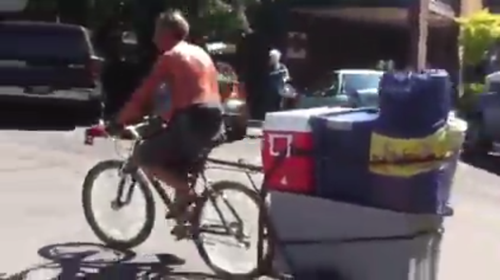
John Brewster (aka “LTD guy”)
In a town well known for its eccentric and colorful residents, John Brewster is one of a handful of figures who stand out even amongst Eugene’s characteristically odd landscape. Better known as the “LTD Guy”, Brewster has been riding around downtown screaming about his nether regions for well over a decade now, often while dressed in flamboyant costumes. Brewster’s tirades against the Lane Transit District have earned him a certain degree of notoriety, and he has achieved a local cult status with an accompanying fan club. Many people cheer him on as he passes by, while others roll their eyes in annoyance or ignore him outright. In the warmer months, Brewster can often be spotted on a daily basis, sometimes several times over the course of a sunny afternoon.
Brewster’s story and history has been profiled in local media and he has even been the subject of a student documentary, and yet most people in the community who see him on any given day still don’t know what he’s so angry about. They laugh, they make small conversation, they note the differences over time in his costume or his script, but the point of his rant or the history behind it is lost on them for the most part. It’s evident from the way that most people react to Brewster that the story behind his anger is not nearly as significant or meaningful to them as the spectacle that is Brewster himself.
John Brewster is one of Eugene’s (mostly) celebrated outsiders, and in the minds of many, the community’s enthusiastic embrace of such figures demonstrates our local values in action, the idea that Eugene is an inclusive community that accepts everyone despite their quirks. But while so many cheer on and support these eccentric local celebrities as a testament to the idea of radical inclusion, what so many fail to recognize is the fact that the circumstances surrounding their notoriety are a result of systematic exclusion policies, policies which seemingly stand in stark contrast to the ideas and values around inclusivity. In embracing the spectacle of the person rather than their actual story, the community can feel good about accepting people of all stripes while conveniently failing to acknowledge the widespread practices that result in such ‘outsider’ status in the first place.
In Brewster’s case, a fight with a bus driver many years ago over whether he could bring his bicycle on the bus resulted in a permanent ban from the LTD bus system, and absent any accessible method of recourse, Brewster has aired his grudges very publicly and theatrically ever since. He is one of a countless number of people who have been banned from the bus system, the vast majority of them homeless and/or mentally ill. And while his theatrics are often embraced, supported, and laughed at, the serious plight of Brewster and so many others is routinely dismissed and ignored. Brewster makes me smile as well, but behind the humor I recognize the dark truths that motivate his actions.
When I saw Brewster ride by on that unusually sunny equinox day, my thoughts immediately went to Glassbar Island, where I’ve seen Brewster sunning himself many times over the last several years. Unlike the theatrical character I often encounter downtown, out at Glassbar he’s not riding around screaming about anything at all. He’s simply one of the regulars, one of many stewards of the land who contribute to the unique character of the hidden little island at the edge of town, a place where outsiders like Brewster go to get away from it all.
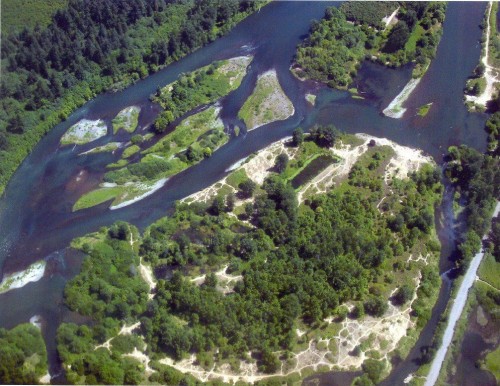
Satellite image of Glassbar Island.
Situated on the confluence of the Coast Fork and Middle Fork of the Willamette River, Glassbar Island was originally known as “Bring Beach” due to the island’s location behind the old Bring Recycling facility, which sat on a county-owned parcel just outside the city limits. For over fifty years now, Glassbar Island has served as a hideaway of sorts for various people, groups, and activities that are not always accepted by the mainstream community. The island first gained a reputation as a nude swimming-hole in the ‘60s, later gained notoriety as a cruising spot in the ‘80s and ‘90s, has served as a sanctuary for the homeless throughout its history, and in the past decade has become recognized by scientists and botanists for its biological diversity and gained a reputation as an ideal spot for nature identification walks. Today, the island is mostly known as a spot for nude sunbathing, but folks of many different stripes not only peacefully co-exist on the island but also cooperatively maintain and care for the area.
Glassbar functions as a self-policing autonomous zone of sorts, publicly-owned yet left to its own devices. The island is open and welcoming to all, provided that one respects a code of behavior that is best described as mutual respect, cooperation, discretion, and leaving no trace. More often than not, I’ve found myself to be the only one on the island who is neither homeless nor naked, and yet I have always felt completely welcome in this community of outsiders. I fall into another category of respectful visitors: those who simply find the place enchanting and otherworldly.
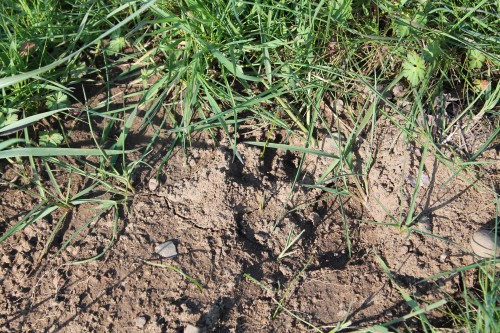
Coyote tracks found at Glassbar Island.
The otherworldly aspects of Glassbar Island are not limited to what is found on the island itself. Getting there is often an adventure plucked straight out of a fairy-tale. In the spring and summer months, the Coast Fork dips low enough that one can easily walk across an ankle-deep natural land bridge to the island. During the rainy season, however, the river has been known to crest at well over twelve feet, cutting off island access to everyone except experienced boaters. While my own local sign that spring has arrived is the spotting of John Brewster, the true sign of spring for the close-knit Glassbar community is the day the river dips low enough to safely wade over.
Even when the river is safe to cross, access is still limited to those “in the know”. For an untold number of years, most people accessed the island from a county-owned parcel that led to the low point of the river, until last year when the County shut off access, citing environmental and safety concerns. The parcel was gated and fenced to keep the Glassbar community out, and according to both the county and the state, the island is designated “river access only”, meaning it is only legally accessible by boat. This has not deterred the regulars, as there are numerous entrance points throughout the adjacent properties that all lead to the river. Those entrances are not easy to find, however, and the lack of knowledge around the current access points has only added to the island’s mystique. In its present state, it is not only an island of outsiders, but of outlaws as well: one must break the law to access it on foot. The island is still public and open to all, but every person who fords the river to the island has committed an act of criminal trespass.
There are many angles to the controversy over restricting land access to the island, but remembering John Brewster’s association with Glassbar always brings me back to the politics of inclusion and exclusion, especially in light of the County’s hyperbolic excuses for closing the parcel. County officials publicly cited problems with prostitution, drugs, and sex trafficking in justifying their actions without offering any evidence to back the allegations, and in response the media outlets and private citizens alike alluded to the presence of nude sunbathers, homeless people, and the gay community as the potential sources of those problems. And while the county’s claims were mostly refuted or disproven by the Glassbar community as well as area residents, the fences went up nonetheless and the voices of opposition were drowned out.
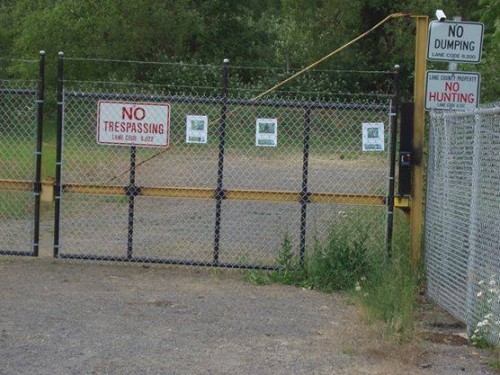
No trespassing gate.
The idea that law and policy has created yet one more restriction on where the John Brewsters of the world are allowed to exist troubles me not only on an ethical level, but on a deep spiritual level as well. Scare tactics were used to defend actions that in the end only served as an attempt to further exclude the already marginalized amongst us, and the interconnectedness between the island itself and the community that interacts with and tends to it was completely disregarded in the equation. Among many other things, it was never considered that the island itself greatly benefits from the community and the stewardship that the Glassbar community provides. To say that the relationship is reciprocal would be putting it mildly.
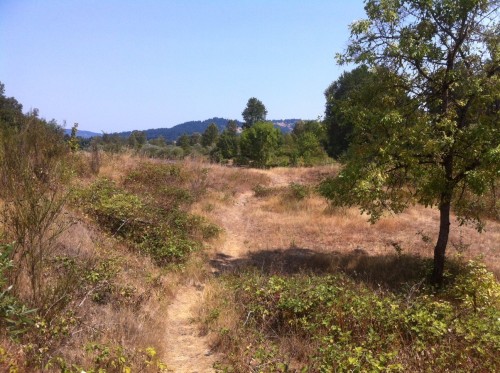
Glassbar path
As I stood downtown on that sunny equinox day, watching John Brewster ride past me as my thoughts drifted to Glassbar, I felt an immediate pull to head out to the island myself, something I’ve never attempted so early in the season. I had spent much of the winter ruminating on the ways that community, exclusion, and perception interact in and with this specific place that is Eugene, and Glassbar contains and expresses each of those elements more concretely than any other singular place I know of here. And at that moment, heading out to the island seemed more of a directive than anything else, a directive that I was determined to fulfill despite the fact that the river was reported to be nearly three feet high at the crossing.
With the sun holding out, a few days later I set out towards the island with two friends, neither who had ever experienced our destination before. And despite setting out with explorative intentions and a focus on exclusion, my initial reasons for the trip evaporated as we were immediately caught up in the area’s magic. From the moment we stepped upon the initial path beneath the trestle that leads out the abandoned haul road, which we followed for a mile to the river crossing in order to trek across the river itself, I felt myself moving in and through a world completely out of place and time, anchored only by the constant reminder that I was supposedly acting as a navigator for my companions. We took off our boots and set out to ford the river, and although I am usually nervous and wary around rivers, the numinous aspects of our surroundings and the otherworldliness of the moment completely drowned out my anxiety. As I stood in the middle of the Willamette, thigh-high in rushing water, my feet grasping for the next river stone in front of me as I tried desperately not to fall, a message came through to me loud and clear, a message that came straight from the river itself:
Do not focus on exclusion so much that you miss the enchantment.
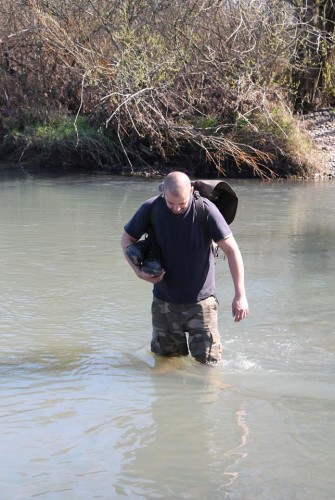
My fellow adventurer crossing the river behind me.
And the enchantment swept over me, midway across the river. As soon as we made it across to the island itself, another friend of mine spotted us and immediately took on a tour guide role, taking us around the island while explaining the history and landscape to my companions. I followed closely, trying to pay attention, trying to process what was occurring in the moment, but I kept slipping away despite my best intentions. Space and boundaries blurred as I walked on, and the more I tried to revisit my original purpose, the more I slipped into the otherworld that lay before me. I always felt welcome on this island of outsiders, but I also have always felt as an outsider myself. This time, I felt a part of the island’s dance, pulled in and transfixed by its numinosity. By the time we had reached the other end of the island, several hours had gone by in what seemed like mere moments. As I stepped in the river to cross back, the feeling of inclusiveness and belonging held me up in one sense, as the physical presence of a friend held me up in the literal sense.
The following day, I walked towards downtown with the ideas of inclusion and enchantment floating around in my brain, and John Brewster came around the corner once again like clockwork. I watched as a group of college students interacted with him, and I thought back to the message I received in the river. Do not focus on exclusion so much that you miss the enchantment. The students were laughing as they spoke to him, obviously enchanted in the moment. The policies and forces that create outsiders like Brewster are often unjustified and contradictory to the stated values of this community, but that does not cancel out the power and the beauty of the community’s embrace of such characters, nor does it weaken the effect that these outsiders can have upon the people around them and the everyday nature of a given place. Despite his exclusion, John Brewster interacts within a place where he feels like he belongs, and he is a part of the dance of this community just as much as I felt a part of the dance of the island. Brewster’s presence is a tragedy of sorts, but his presence is also a gift.
The rains came back in a few days ago, and the Coast Fork is slated to crest at ten feet in the next day or two, once again cutting off access to Glassbar Island. Our island trek the week before suddenly seems like a faraway dream, and knowing that our visit occurred in what turned out to be a small window of accessibility only adds to the mysticality of the experience. The county may not be able to successfully block off access to Glassbar Island, but the river itself can achieve that task without issue. And a community of outsiders will wait patiently until they can cross at the ford once again.
The Wild Hunt is not responsible for links to external content.
To join a conversation on this post:
Visit our The Wild Hunt subreddit! Point your favorite browser to https://www.reddit.com/r/The_Wild_Hunt_News/, then click “JOIN”. Make sure to click the bell, too, to be notified of new articles posted to our subreddit.
Beautifully written….and I love the way you widen my perspective and help me look upon my community in new ways. Love to you and to the land, and to the living.
Ah, you wrote if before I could. Ditto! I thought it was a beautiful piece of work. I could feel the otherwolrdliness; the enchantment. Thank you Alley for writing this!
What lovely writing. Namaste.
Cleveland OH, not exactly a progressive hotbed, has addressed the bike-vs-bus problem with bicycle racks on the front of the bus. Capacity is about six. It’s very liberating for a low-income, carless person not to have to choose between the bike and the bus.
What a beautiful article, thank you!